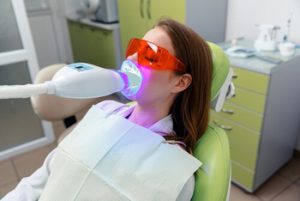Teeth whitening is a popular way to enhance your smile, but it can come with temporary sensitivity. If you are asking how long my teeth will hurt after whitening, it is a question many people find themselves asking. Many people notice changes they did not expect and wonder what to make of them.
This guide will help you understand what influences discomfort and what you can do to ease it safely.
Why Sensitivity Happens After Whitening and When It Should Settle
If your teeth feel sore or sensitive after a whitening session, it is not unusual. Understanding what causes this and how long it typically lasts can make the experience more manageable.
 Sensitivity After Whitening Is Often Short-Term
Sensitivity After Whitening Is Often Short-Term
For most people, tooth sensitivity after whitening begins within a few hours after treatment and usually subsides within 24 to 48 hours. In some cases, it may linger for a few days, especially if teeth whitening products are highly concentrated. Mild teeth sensitivity is your body’s reaction to the temporary changes in the tooth enamel during the whitening process. If the sensitivity persists beyond a few days, it may be worth discussing with a dental professional.
The Strength of the Whitening Product Makes a Difference
The amount of hydrogen peroxide in the bleaching gel affects how much discomfort you might feel. In-office professional teeth whitening uses higher concentrations for quicker results, which may cause more short-term sensitivity. On the other hand, over-the-counter products and at-home kits generally use weaker solutions and cause less discomfort, but they may take longer to show results. If you have worn enamel or thin teeth, these treatments can still cause teeth whitening sensitivity, even at lower strengths.
Gums and Soft Tissues Can Also React
It is not just your teeth that may feel tender. If whitening agents come into contact with your gums or soft tissues, you might notice a stinging or irritated sensation. Ensuring the gel stays within the trays and does not overflow is essential to protect these areas. If you have a history of gum inflammation, you may feel this more acutely.
Eating Habits Right After Whitening Can Aggravate Sensitivity
Following a teeth whitening treatment, eating hot or cold foods too soon can increase discomfort. Sticking with lukewarm meals and avoiding acidic foods helps your teeth settle faster. Rinsing with plain water and avoiding sugary foods during recovery can also prevent additional irritation.
Individual Factors and Dental History Play a Role
Some people experience sensitivity more than others due to naturally thinner enamel, past dental procedures, or exposed tooth roots. A personalised consultation with a dental professional before treatment helps determine which teeth whitening treatments are appropriate based on your dental history and risk level.
How to Manage Sensitivity and Help Your Teeth Recover
There are practical ways to reduce discomfort and shorten the recovery period after a teeth whitening procedure. These tips make it easier to continue enjoying the results while protecting your teeth.
Use Sensitive Toothpaste Before and After Whitening
Switching to a desensitising toothpaste a few weeks prior to your appointment helps strengthen your enamel. Products made for sensitive teeth can also be used after treatment to ease symptoms. These formulas often contain compounds that block the pathways triggering pain. Ask your dental provider to recommend a brand that complements your whitening routine.
Avoid Hot and Cold Drinks for a Few Days
Your teeth may react more strongly to temperature shifts after a whitening procedure. Limiting your exposure to cold drinks or piping hot tea reduces the risk of discomfort. Room-temperature beverages are a safer choice until your teeth settle. This simple change can make a considerable difference in how long sensitivity lasts.
Apply Desensitising Gel as Advised
Many professionals provide or recommend a desensitising gel to use after whitening. This gel is applied to clean teeth using a tray, much like the whitening gel. It helps calm nerve endings and encourages the enamel to remineralise. If discomfort is moderate to strong, using this product can shorten recovery time and make your teeth more comfortable within hours.
Brush Gently With a Soft-bristled Toothbrush
After any whitening treatment, your enamel may be slightly more porous. To avoid irritating your teeth further, brush gently using a soft-bristle toothbrush. Harsh scrubbing can strip enamel and worsen sensitivity. Fluoride-based toothpaste provides added protection and supports enamel healing after whitening.
Plan Your Whitening Around Your Schedule
It helps to choose a time when you do not have major events planned immediately afterwards. This gives your teeth time to adjust. If you are preparing for a wedding or event, do your tooth whitening a week in advance to give yourself a buffer. This approach is especially useful if it is your first time using whitening products.
Supporting Your Smile After Whitening: Book Your Appointment With Us Today
 While the duration of post-whitening discomfort varies from person to person, most people find relief within a few days. Mild tooth sensitivity is a common side effect of the whitening process, especially when high-concentration products are used. With proper guidance, temporary discomfort does not need to overshadow your results. A few smart changes, like using sensitive toothpaste and limiting exposure to triggers, can make all the difference. Those experiencing tooth sensitivity should also avoid hot or cold drinks and hot and cold foods to prevent aggravating the enamel. Surface stains can be safely lifted with the right approach while protecting long-term comfort.
While the duration of post-whitening discomfort varies from person to person, most people find relief within a few days. Mild tooth sensitivity is a common side effect of the whitening process, especially when high-concentration products are used. With proper guidance, temporary discomfort does not need to overshadow your results. A few smart changes, like using sensitive toothpaste and limiting exposure to triggers, can make all the difference. Those experiencing tooth sensitivity should also avoid hot or cold drinks and hot and cold foods to prevent aggravating the enamel. Surface stains can be safely lifted with the right approach while protecting long-term comfort.
Our team can help you select the safest treatment options based on your individual needs and enamel health. Let us help you enjoy a brighter smile without unnecessary discomfort. Call us today on (02) 9054 5281 to schedule your personalised whitening consultation.
References
https://www.hopkinsmedicine.org/health/conditions-and-diseases/sensitive-teeth
https://www.colgate.com/en-in/oral-health/tooth-sensitivity/what-causes-sensitive-teeth


 Sensitivity After Whitening Is Often Short-Term
Sensitivity After Whitening Is Often Short-Term